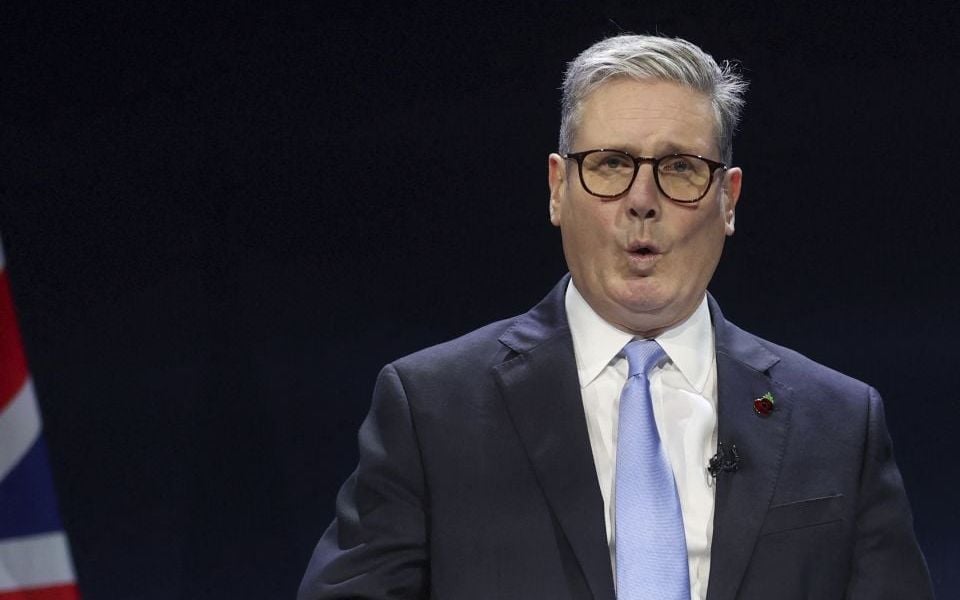
British Prime Minister Keir Starmer delivers a speech at the Interpol General Assembly in Glasgow, Scotland, Monday. [Russell Cheyne/Pool Photo via AP]
There was a time last year when it appeared that Britain might have finally escaped the cycle of instability that had convulsed the country since the Brexit referendum. The election of a Labour government with a landslide majority in July 2024 was supposed to draw a line under eight years of turmoil under the Conservatives, during which the UK was led by five prime ministers and endured a mini financial crisis.
Yet British politics is once again in a febrile state ahead of a budget later this month at which the government is expected to break a solemn election commitment not to raise income tax. That follows a disastrous first 15 months in office that has seen Labour’s support slump to just 17 percent in the polls, behind Nigel Farage’s right-wing populist Reform party and the newly energized left-wing Greens. Meanwhile, Sir Keir Starmer’s approval ratings have slumped to the lowest for any prime minister on record. There is speculation that he could face a leadership challenge within the year.
Breaking the manifesto commitment on tax would be a huge breach of trust for a party that made this pledge the centerpiece of its election campaign. Nonetheless, Labour has little choice. This situation has been forced upon the government partly by Britain’s weak growth, which has come in lower than anticipated, partly by its own promise to stick to “ironclad” fiscal rules, but above all by the bond markets, which have made clear they are unwilling to fund any increase in UK public borrowing.
Britain has the highest bond yields of any major economy, reflecting both higher inflation and a lack of trust in the British state to control its public finances. Confidence took a further knock earlier this year when the government proved unable to deliver even modest planned cuts to welfare spending amid intense opposition from its own parliamentarians. Ever since the Liz Truss debacle in 2022, UK debt has had to pay a premium to borrow from the markets – its bonds have traded at higher yields than the inflation outlook alone would justify. Goldman Sachs reckons this risk premium currently adds one percentage point to the 10-year yield.
Labour argues that Britain’s dire fiscal position results from circumstances beyond its control. Rachel Reeves, the chancellor, blames the global financial crisis, Covid pandemic and energy shock from the Russia-Ukraine war for the surge in public debt, which now stands just short of 100 percent of GDP. She blames Donald Trump’s trade wars for dampening growth and pushing up borrowing costs. And she blames the previous Conservative government for a deeply damaging Brexit that has undermined long-term growth potential and a policy of austerity that starved public services and infrastructure of investment.
All of this is true. Labour’s inheritance was dire. But the government’s problem is that all of this was known at the time of the election. Indeed, almost all credible economists argued that taxes would inevitably need to rise. At the same time, many of Labour’s own actions since taking office have made a difficult situation worse. An ill-judged hike in payroll taxes succeeded in both dampening growth and pushing up inflation. The result is that UK inflation is now nearly double the eurozone rate at 3.8 percent, while interest rates stand at 4 percent compared to 2 percent in the euro area. Meanwhile, taxes targeting wealthy foreigners made Labour look as if it was not serious about growth.
The government’s embarrassment over tax might be less damaging if it had a compelling growth story to tell. But despite promising to make growth a priority, the new government lacked clear plans to revive the economy beyond relaxing planning rules and spending on green energy infrastructure. Starmer, a lawyer by profession, has never shown interest in economics, while Reeves’ plans for industrial subsidies had to be abandoned due to fiscal constraints. The result is a near-mutinous mood among Labour Mps, who accuse Starmer of lacking a vision to get the country out of its slump.
Britain therefore finds itself in a similar situation to France, which is also engulfed by political turmoil as the government tries to pass a budget that will bring public debt under control. In some respects, Britain’s position is more challenging. Although its deficit and debt are smaller, the UK spends 10 percent of government revenues on interest payments compared to just 4 percent in France. This reflects the fact that Britain collects insufficient tax relative to the size of its public sector. Britain has not run a primary budget surplus for 30 years. What’s more, Britain cannot rely on the implicit backing of the European Central Bank to keep its borrowing costs down.
Yet the UK retains advantages. Labour’s large majority and the fact that the next election is not due until 2029 means the government has time to recover from its missteps. Unlike France, the UK government appears committed to rein in borrowing and meet its fiscal rules. More surprisingly, even the opposition has discovered fiscal discipline. Last week, Nigel Farage repudiated Reform’s previous promise of £90 billion in tax cuts, committing instead not to cut taxes until the deficit is closed. This suggests the next election will be fought on a more realistic economic basis than the last.
Nonetheless, the November 26 budget is a moment of jeopardy for Starmer, Labour and Britain. Unless the government can articulate a credible vision for how Britain escapes its cycle of stagnation, the country may be condemned to yet another round of political upheaval – and the next populist backlash may prove harder to contain.
Simon Nixon is an independent journalist and commentator on British, European and international political economy and geoeconomics.